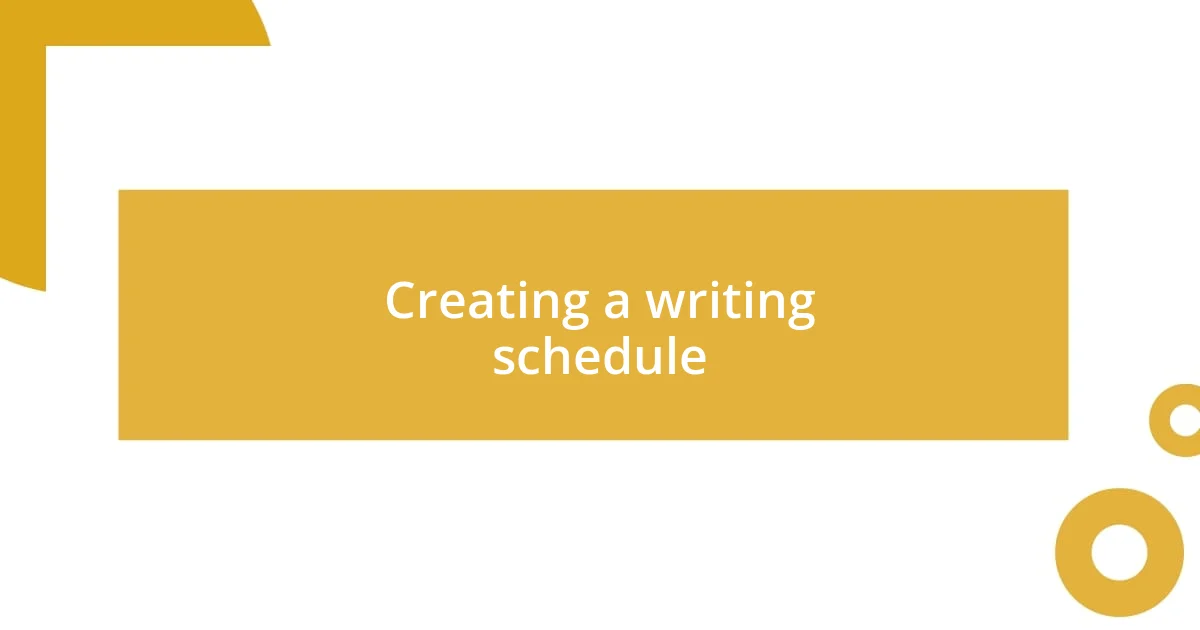Key takeaways:
- Setting realistic writing goals enhances motivation, reduces anxiety, and fosters personal growth.
- Assessing current writing skills and seeking feedback is crucial for identifying areas of improvement.
- Tracking progress and maintaining a flexible writing schedule help sustain creativity and accountability.

Understanding writing goals
Understanding writing goals involves recognizing their role as guiding lights in your writing journey. When I first started writing, I remember feeling adrift, unsure of what I wanted to achieve. How do we expect to reach a destination if we don’t even know which path to take?
Setting realistic goals is crucial because it shapes our writing experience and productivity. I’ve experienced the frustration of aiming too high, only to feel defeated when I couldn’t meet those expectations. This really highlights the importance of breaking down our aspirations into smaller, manageable tasks. Have you ever felt overwhelmed by the sheer ambition of your writing dreams? I know I have, and it’s a reminder that we often need to recalibrate our objectives.
Ultimately, writing goals are personal and should resonate with our individual experiences and aspirations. They can be about the number of words per day, the completion of projects, or even honing specific skills. I’ve found that aligning my goals with my values makes the process not just productive but also enriching. What would happen if you started crafting your goals in a way that excites you and keeps you motivated?

Benefits of realistic goals
Setting realistic goals comes with a wealth of benefits that can truly reshape your writing experience. For me, one of the most significant advantages has been the boost in my motivation. I remember a time when I set an ambitious goal to write a novel in three months. Instead of being motivated, I felt pressure and dread. It wasn’t until I adjusted to a realistic goal of writing a few pages each week that I found my creativity flowing again. Suddenly, writing became a joy rather than a chore.
Here are some key benefits of realistic writing goals:
- Increased Motivation: You feel more energized and excited to write when you see progress.
- Reduced Anxiety: Less pressure means you can enjoy the writing process without fear of failure.
- Better Focus: Clear, achievable goals help you concentrate on what matters most.
- Enhanced Productivity: Consistent, small achievements lead to greater overall output.
- Personal Growth: Realistic goals allow you to continually develop your skills over time.
- Sustainable Habits: They help you establish a writing routine that’s easy to maintain.
Every step towards a realistic goal feels significant, fostering a positive mindset that encourages further growth. After all, writing should be a journey of exploration, not a ticking clock.

Assessing your current writing skills
Assessing your current writing skills is an essential step before setting realistic goals. Reflecting on your strengths and weaknesses can provide clarity on where to focus your efforts. I recall a time when I thought I was an excellent storyteller, only to realize that my editing skills were lacking. This self-awareness allowed me to seek out resources that would help me improve and, ultimately, grow as a writer.
Conducting a skills audit can be a game-changer. Consider keeping track of your writing practice by maintaining a journal or a portfolio. I often jot down my observations on what works well and what doesn’t in my pieces. When I look back at these notes, it’s enlightening to see my progress over the months. Have you ever revisited your earlier work and noticed how much you’ve improved? It’s a fantastic way to boost your confidence and motivate you to keep going.
Lastly, don’t shy away from seeking feedback from peers or writing groups. Constructive criticism can unveil insights you may not notice on your own. I remember getting feedback on a piece I was proud of, only to find that I had repeated the same phrases. While it stung a bit, that input has transformed how I approach my writing. Embracing such feedback fosters growth and opens doors to new ideas.
| Skill Area | Self-Assessment |
|---|---|
| Content Creation | Excellent |
| Editing and Revising | Needs Improvement |
| Grammar and Style | Good |
| Creativity | Very Good |

Setting measurable writing targets
When it comes to setting measurable writing targets, specificity is crucial. I’ve learned that instead of saying, “I want to write more,” it’s far more effective to set a target like “I will write 500 words a day.” This shift has been transformative for me, as it turns writing into a tangible goal that I can track. Have you noticed how satisfying it feels to hit a specific word count? It’s like crossing off a box on your to-do list—instant motivation!
I remember when I decided to tackle a writing project by breaking it down into weekly milestones. Instead of overwhelming myself with the idea of completing an entire chapter, I focused on writing one scene each week. This approach not only made the task feel less daunting, but it also allowed for a more thoughtful and creative process. Have you ever tried breaking your goals into smaller, more manageable tasks? It can really help prevent burnout and keep the passion alive.
Additionally, I find that tracking my progress enhances my writing experience. I created a simple spreadsheet to log my daily word count, and seeing those numbers grow gives me a sense of accomplishment. It’s motivating to reflect on how far I’ve come over time. Do you have a method for tracking your writing? Even a simple journal can serve as a source of inspiration and validation, reminding us that every little step contributes to our overall journey.

Creating a writing schedule
Creating a writing schedule is one of the most effective strategies for maintaining consistency. I remember the feeling of chaos when I would sit down to write whenever inspiration struck. It often led to long droughts where nothing would come to mind. By setting aside dedicated writing time—like Saturday mornings—I found that I could channel my creativity much better. Have you ever tried scheduling your writing? It can cultivate a habit that makes inspiration feel like it’s always within reach.
One key element I discovered is the importance of flexibility within that schedule. Life, as we all know, can be unpredictable. Early on, I would get frustrated when something disrupted my planned writing time. But by allowing myself to shift my writing sessions without guilt, I learned to prioritize creativity over rigidity. It’s truly liberating to adapt while still honoring your commitment to writing. How do you handle interruptions to your schedule?
Another tip is to mix writing tasks within your schedule. I often blend writing new content with editing or brainstorming ideas. This variety keeps me energized and prevents burnout. For instance, on days when I’m feeling particularly inspired, I dive into drafting new chapters. On other days, when I crave a lighter load, I might focus on refining previous drafts. How do you manage different writing tasks? Embracing this multidimensional approach has made my writing schedule not just a timeline, but a dynamic and enjoyable part of my routine.

Overcoming common writing challenges
One common writing challenge I’ve faced is the dreaded writer’s block. It used to paralyze me, leaving me staring at a blank page for hours. I found that stepping away and engaging in a different activity—like going for a walk or cooking—can spark new ideas. Have you ever experienced a moment where a sudden thought strikes while you’re doing something completely unrelated? I realized that sometimes, the best way to move forward is to first take a step back.
Another hurdle is dealing with self-doubt. There were times when I’d question my writing abilities, which halted my progress altogether. I discovered that sharing my work with a trusted friend not only provided fresh perspectives but also reminded me that I’m not alone in this journey. Don’t you find comfort in knowing others face similar struggles? Opening up about my writing opened doors to encouragement, and that support has been a game-changer for my confidence.
Finally, managing distractions while writing can be a real obstacle. I remember a time when I tried to work in a bustling café, but the noise and activity distracted me more than I anticipated. Now, I create a focused atmosphere by using apps that block social media or even just finding a quiet nook at home. Have you ever experimented with your writing environment to see how it impacts your focus? Finding your ideal space can truly transform your writing experience, allowing ideas to flow more freely.

Tracking progress and adjusting goals
Tracking progress is a vital part of achieving realistic writing goals. I’ve always been a fan of keeping a journal where I jot down my daily word count and any reflections on what went well or what didn’t. In my experience, seeing those numbers grow week by week is incredibly motivating—like a little personal victory every time I put pen to paper. Have you ever noticed how satisfying it is to physically document your achievements?
It’s equally important to be prepared to adjust your goals based on your progress. For instance, there were moments when I realized that my original word count targets were either too ambitious or not challenging enough, which left me frustrated or bored. Now, I assess my pace regularly and tweak my goals accordingly, ensuring they remain realistic yet inspiring. How often do you find yourself reevaluating what you aim for? I’ve learned that flexibility not only keeps me engaged but also helps me celebrate small wins, fostering a more positive writing mindset.
On top of that, I’ve discovered the power of accountability in tracking my goals. I joined a writing group where we share our progress weekly, and it’s amazing how this simple act of reporting can energize my productivity. Knowing that I’ll update someone else about my week’s achievements makes me more committed to hitting those targets. Have you considered finding a writing buddy or joining a group? You might be surprised at how much it can elevate your writing journey!















